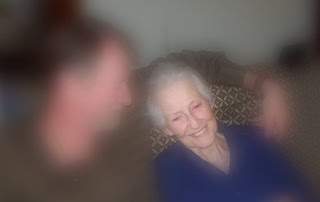Maybe predictably, my fourth daughter, the last of my babies, was a Mama’s Girl from birth. She had a fevered lust to run with the pack of her older sisters and so walked and talked at what I had thought, up to then, was an impossible age: 7½ months, on both counts. But still she never danced and pranced her way far from my reach, my little bundle of starshine who loved to bask ceaselessly in the light she put in my eyes.
I knew she was the last one. Don't misunderstand, all of my girls enthralled me equally — you can’t have more than one and not know that each is born constitutionally different from you, all their sibs, and everyone else in the world at large. You can’t not marvel at the way they are delivered to this life with a unique set of baseline traits that, really, have very little to do with you. You try to both respect their individuality and guide them to color just a little bit inside the lines. But on the occasion of closing the door on my childbearing years, I relaxed decidedly and let the last one be, to see what would happen if she was mostly left to her own devices, to test out her inborn gregariousness to the max.
Out of respect for her privacy, I will only say here that, just as I might have imagined, she has found a stage. The very biggest one available to her at this relatively young age — she has found it, taken it for her own, pressed a boot to its neck to the sound of rousing applause. In this way, I cannot imagine she is related to me in any way. I am clapping madly, too, but looking furtively from her, down to the belly that once housed her prenatal self, back to her, back to my belly ... I am so her mother! I was there the day she was born!
Like most any parent, my dearest wish is that she love her life, passionately, always. I can’t help but hold my breath a little too, though, as she steps into a particular worldview I do not understand, with a unique set of baseline traits I do not understand. Beware Narcissus’ pool, I want to whisper. Today's trade in human capital changes at lightning speed in the matrix of our jet-fueled mass communications; the parameters of what can be bought and sold, from our bodies to the quarks expressing themselves deep within our minds, are so very hard to define now. (Daughter: know that virtual “stages” must be taken with extreme care.) That age-old mother-mantra — oh please don’t get hurt — sounds with every beat of my heart. Some other less definable body part echoes, don't hurt others.
I also am coming to accept a major change from our auspicious mother-daughter beginning. I, once the designated center of her universe, am a dying sun in my growing daughter’s eyes. No really — I've already been through the normal teenage rebellions with three other daughters, the temporary rejections of all that I stand for, the vitriolic I hate yous! that landed sure and straight as Artemis's arrows. Whomever a small child might imagine her mother to be always becomes someone more human, as that child matures. This is different. The script that my youngest is writing on the stage of her mind, about me, is gelling into something more permanent, I think. I am beginning to realize she probably won't outgrow it. I, being quite simply who I am, can't rise to the occasion of the life this brilliant young artist wants for herself. I will always fall short.
To be clear, her version of me is her truth, her reality. It would be quite wrong of me, to diminish that in any way. I am just taking some comfort in the memories of our perfect early years together, and the thought that there's only one way to go, from perfection in a baby's eyes. She will always, always be my little Star.
To be clear, her version of me is her truth, her reality. It would be quite wrong of me, to diminish that in any way. I am just taking some comfort in the memories of our perfect early years together, and the thought that there's only one way to go, from perfection in a baby's eyes. She will always, always be my little Star.




